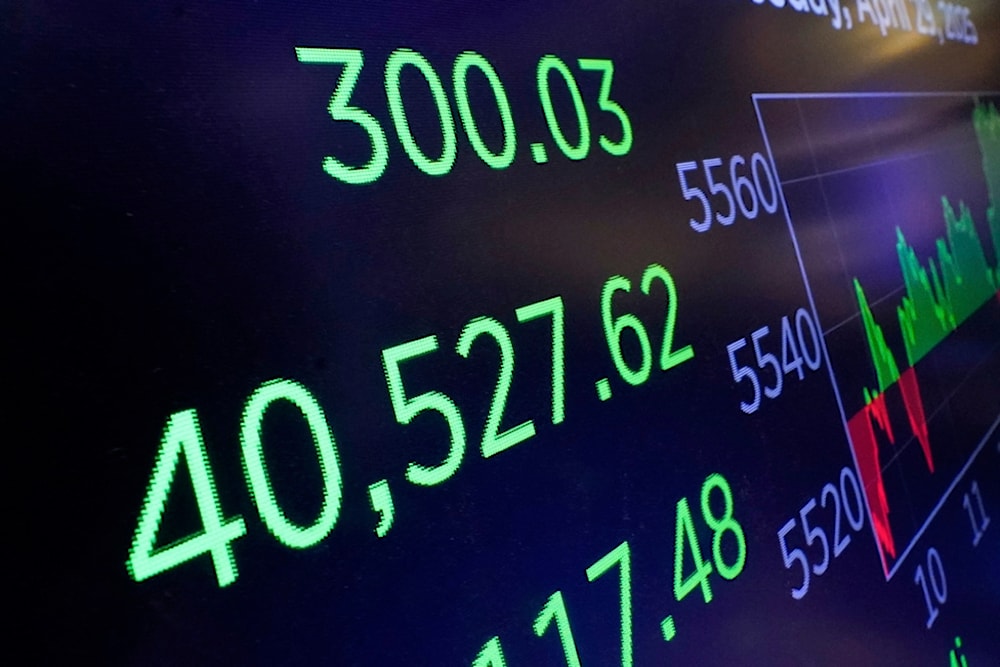Markets suffer worst 100-day start under Trump's second term: FT
Trump's aggressive approach to global trade — centered on imposing "reciprocal" tariffs on most trading partners — has fueled volatility and undermined investor sentiment.
-

A board above the trading floor of the New York Stock Exchange displays the closing number for the Dow Jones Industrial Average, Tuesday, April 29, 2025 (AP Photo/Richard Drew)
The Financial Times on Wednesday reported that US stocks are experiencing their worst start under a new presidential term in 50 years, with the S&P 500 falling nearly 8% during the first 100 days of Donald Trump's second administration.
Markets opened slightly lower on Tuesday, with the S&P down 0.4%, capping a turbulent stretch marked by investor anxiety over Trump's sweeping trade moves. The sharp decline has unnerved investors, as concerns mount over a possible inflation spike triggered by tariffs and growing uncertainty surrounding US economic prospects.
According to Financial Times analysis of FactSet data, the last time equities performed this poorly at the beginning of a presidency was in 1974, during Gerald Ford's early months in office, when markets were weighed down by recession fears and soaring oil prices.
Trump's aggressive approach to global trade, centered on imposing "reciprocal" tariffs on most trading partners, has fueled volatility and undermined investor sentiment. As JPMorgan Asset Management's David Kelly put it: "We've decided to have a fight with every kid in the playground at the same time. Markets are telling us that there is doubt about whether the US has the advantage when they've taken on the whole rest of the world."
Tariff Turmoil
The steady stream of trade-related declarations from the White House has left financial markets reeling. George Pearkes, a macro strategist at Bespoke Investment Group, said, "My model for where we are is Wile E. Coyote with his legs spinning in the air trying to figure out how big of a cliff we've just jumped off."
April 2 marked a particularly volatile moment when markets plunged following Trump's announcement of broad new tariffs, though losses were partially reversed after the administration delayed most of the measures by 90 days.
Read more: US stocks rise after Trump opts for a gentler tone on China
Many on Wall Street had predicted a bullish run under Trump's second term, given the Republican focus on tax cuts and deregulation. Instead, over ten major US banks have cut their year-end targets for the S&P 500, and capital has flowed out of dollar-based assets.
Morgan Stanley's Lisa Shalett noted that Trump's tariff-heavy agenda has thrown markets into disarray: "Investors have a right to feel exhausted," she said. His "liberation day" tariffs, she added, "catalysed the market chaos... with on again, off again tariff policies promulgating maximum uncertainty periodically punctuated by statements from the administration aimed at reassurance and de-escalation."
Investor Retreat
Foreign ownership of US stocks began the year at a record 18%, but roughly $60 billion has been sold since March, with European funds leading the exodus, Goldman Sachs reported.
The broader fallout has also hit the US dollar and Treasury bonds. Meanwhile, tech giants that once led market gains have become vulnerable. Tesla, Alphabet, Nvidia, and Meta, key members of the so-called Magnificent Seven, are now being viewed by some investors as overexposed. Citigroup revealed in a client note that these companies have become "crowded shorts." As Kelly remarked, "Anyone who was all in on the [Magnificent Seven] has been hurt."
Despite the turbulence, Trump has downplayed the reaction from Wall Street. Thierry Wizman of Macquarie observed that the president may be evaluating his progress based more on policy delivery than market outcomes: "He's done what he said he would, rather than on whether the results have so far been good or bad."
Read more: ‘Nothing will stop me’: Trump talks tariffs, migrants, and Musk

 4 Min Read
4 Min Read








